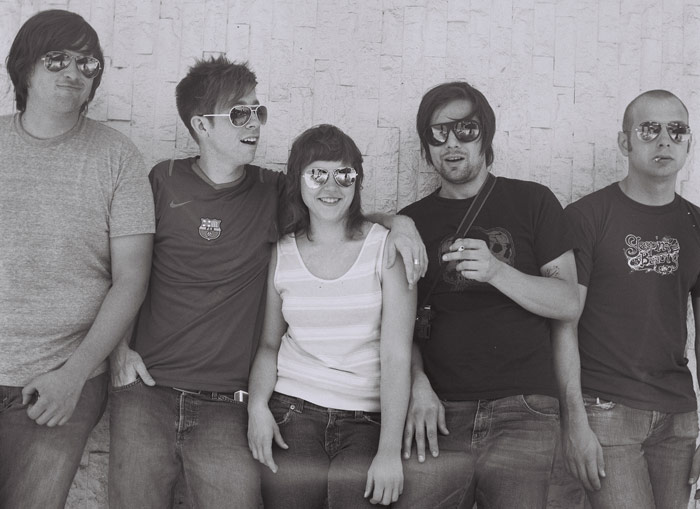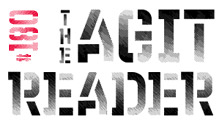
El Jesus de Magico
by Kevin J. Elliott
The saying that absence makes the heart grow fonder couldn’t be more true when it comes to Columbus quintet El Jesus de Magico. It seems the more the band fragments (either by moving out of town or spreading their talents toward other projects) and their time together exponentially dwindles, the more abject love each of them pours into the cult of El Jesus. This absence also makes the longing grow stranger, woolier, and more amorphous by the minute. Evidence can be found concretely on Just Deserts, the band’s new album that for unknown reasons sat on the shelf for more than a year. Though the record represents the closest approximation to the intangible psychedelic ascension achieved when singer Jon Witzky, bassist Sarah Yetter, guitarist Dave Capaldi, organist and mixologist Tony Allman, and drummer Michael O’Shaughnessy appear onstage together, it also displays El Jesus as a full-blown studio endeavor. In the months these recordings have remained unheard, Allman took it upon himself to cut and paste the Just Deserts sessions into a face-melting lacquer of droning improvisational jams, Kraut explorations, and muddled post-punk and pop squalor, making descriptions of the band in their current state impossible. This is exactly why I decided to let them shed some light on this monster themselves. Though some answers to this riddle become clearer, as you’ll read in my e-mail exchange with Allman, O’Shaughnessy and Capaldi, it is that same irreverence that fuels them.
Just Deserts—what does it mean? I know you guys are deep into nature, Gnosticism, ritual and psychotropic experimentation, so are we are to just take this album at face value or is there something underneath the surface we need to be looking for?
Michael O’Shaughnessy: As far as the titles go, they are usually the last things added to pieces or albums. Short of a few of Jon’s solid title ideas, song names and record titles have always been Tony’s work. Maybe he decided that since Jon and I came up with such a stupid name for the band, he wouldn’t let either of us name anything else. Or, maybe it’s because when we talk about one song or another, we use signifiers from our own language as a band. “Jear jiki jear ja jear, jiki jear, jieeeeer” is the intro to “LGNO,” for example. Surely this sounds bland and demystifying, but it’s the truth. The titles, while brilliant, mean nothing to me as the drummer but so much to me as a listener. I have clear pictures of each song in my head while playing them, but they are myopic and solipsistic compared to the picture I get when I listen to the record and the band as a whole. I have a silly idea as to what Just Deserts means, but I want to keep that in my pocket and think about it on my deathbed. So yes, more deism, yes, more ergot and wormwood and look in the mirror and ask yourself if you’ll get your Just Deserts. Just spell it right.
Tony Allman: To me, it’s the notion of being left, even on the smallest, most minor scale, what an ending sounds like if no one is there to witness it.
I know this record has been in the can for a while now, but has just been released. How long ago was it finished? Where was the band’s collective headspace at that time?
TA: It has been done for quite a while. It was sequenced a little over a year ago and most of it recorded long before that. I’m not really sure about the collective headspace. We were very far apart in many ways.
MO: Tony finished this version of the record last summer. He had done a version before and sent it to Adam Smith (of Columbus Discount Records) to press at Musicol, but the EQ on the B-side was all womperjaw and sounded bad to everyone after the lathe was cut. Most of the songs were from the last few weeks at the funeral home (the band’s old rehearsal space) before Tony moved to that little borough where trends go to die, and then there was a slice or two from a session at Columbus Discount Records when Tony came back to grab the last of his stuff that I didn’t destroy before he signed the lease in that city of infinite rendezvous. Jon howled like a poorly exorcised ghost, and it was the type of sound that vinyl can’t capture.
Did the long time between finishing the record and releasing the record allow for some more mixing, twiddling and sonic foolery?
Dave Capaldi: The twiddling was the finishing. Tony put in a ton of work picking out jams from the last days at the funeral home and piecing them together with spells and sonic duct tape.
TA: Yes, I got to mess with all of the reels on my Tascam for a few months. It was the first time I’ve ever had too much time to tinker with tapes and it was a really bizarre experience, mostly because I was separated from the band completely and Just Deserts is cobbled together from improvisation. There are only two “songs” that were written ahead of time. The rest is stitched together from funeral home takes.
MO: The music is the head; Tony is the milliner.
I know you’re somewhat fragmented as a traditional band these days, with Tony in New York, so how do you think that has affected the recordings? Is the time when you are all in the same room precious, as if you need to get the gathering on tape?
TA: It is and it isn’t. We never had a dictator or director, so the few times we’ve been able to play since I’ve moved have been interesting in that we are all sprinting towards creation. That can go either way though.
MO: We try to record everything. We have poor memories, so every time we meet to play it’s special and it really has been since the start. There are blocks of time in my past where I only looked forward to meeting for practice. This didn’t always translate to the best songwriting, though. And yes, even if I run into Sarah, Jon and Dave at a bar, it’s precious. Tony’s not made out of plane tickets, though.
I’ve always thought you were most powerful as a live band, with lots of improvisation and lots of volume. With shows few and far between, is that part of the band finished?
TA: No, I’d say that’s all that’s left for the time being.
MO: Nope. Jon has a new project, Lightning Path. Sarah plays with Marcy Mays (of Scrawl) and Jen Burton in Birds of Hair. Dave is working on solo stuff and plays with Unholy Two sometimes. I’m in three other bands at the moment. Tony toured Europe and played Primavera with Dan Melchior, which is a big reason we’re doing a show for this record. (It’s a benefit for Dan’s wife Letha’s cancer treatment.) We all have—and have had—plenty of other crap going on in our lives that has nothing to do with the band. We just can’t get together and play weekly like we used to, and that’s fine. It’s something I have to deal with because I have no other outlet that empties the same cache in my mind. When we get together, it’s not all catch-up visiting. We pick up right where we left off. If anything, it forces us to focus on ourselves when we’re apart, so when we get a chance to play together we don’t have to slough off the dead scales.
That said, I do feel like Just Deserts really captures that amorphous feeling the band projects live better than any of your previous records. Was that a conscious idea when recording the album?
TA: No, I think I learned a lot from the last LP. Making that record, it kind of ran away from me. I wanted this one to better represent the funeral home and what our time meant there. This is the side of the band that was just for us, our biweekly support group. When all the glasses are dirty, you drink from one bottle.
DC: I don’t think there were any conscious ideas when we were recording this stuff. We were just doing what came natural at practice. The record didn’t exist until the songs did.
Then again, especially on “Bone Knife,” it sounds like more time has gone into writing structured songs. Do you ever think you’ll settle on one side or the other for a record? Where’s the pop record?
DC: I think part of what’s made us who we are is the constant struggle between the pop songs and the weirdo jams. That struggle allows us to do whatever we want and it’s still us. I tend to think the pop-ish songs have their place as sort of brief spurts on the three 7-inches that we’ve put out. I don’t think any of us are comfortable enough with our structured side to let the pop-ish songs get that much space on a 12-inch, but you never know.
MO: I think that our idea of pop is what you hear. The songs on Just Deserts are distilled “pop” versions. I mean, the singles are short pop songs, really. I don’t really think it was conscious to make stuff sound challenging or weird, it just came out that way.
TA: Pop songs are hard to get right, especially when you don’t particularly enjoy them.
What does the future hold for El Jesus de Magico? Given that Just Deserts was recorded more than a year ago, do you have new recordings in the tank? What direction do you think you’re headed?
DC: Hard to say where we’re headed. It’s hard to keep in the swing of things when we’re spread out like this. I could see us getting together for some shows here and there and maybe even a new record eventually.
MO: Tony has a collection of material that rivals Tupac. Just the other day a live recording from a show at Carabar came on my iTunes and I had absolutely no recollection of writing the particular song. So, there’s plenty of material waiting, and as far as the newest stuff we have, it’s on Just Deserts. If I could work it out logistically and monetarily, I’d ride to New York and back weekly in order to practice. I guess I’m just still waiting for that big check from CDR from the first record’s sales. Adam Smith said he mailed it.
TA: I’ve been fiddling with some reels. There is always material I’m digging up. I have a live set from the funeral home that I would like to release soon. There is more, but it’s hard to say. I will always be in this band and I miss them terribly.
PRIMITIVE FUTURES
Household, Items
Los Llamarada, Gone Gone Cold
December Singles Round-Up
Introducing... Radio People
Another Wave from the Aussie Underground
Introducing... Spanish Prisoners
November Singles Round-Up
Speculator, Nice
Introducing... Gross Magic
Jerusalem and the Starbaskets, DOST
Sic Alps, Breadhead and "Battery Townsley"
King Dude, Tonight's Special Death
September Singles Round-Up
Introducing... Acid Baby Jesus
